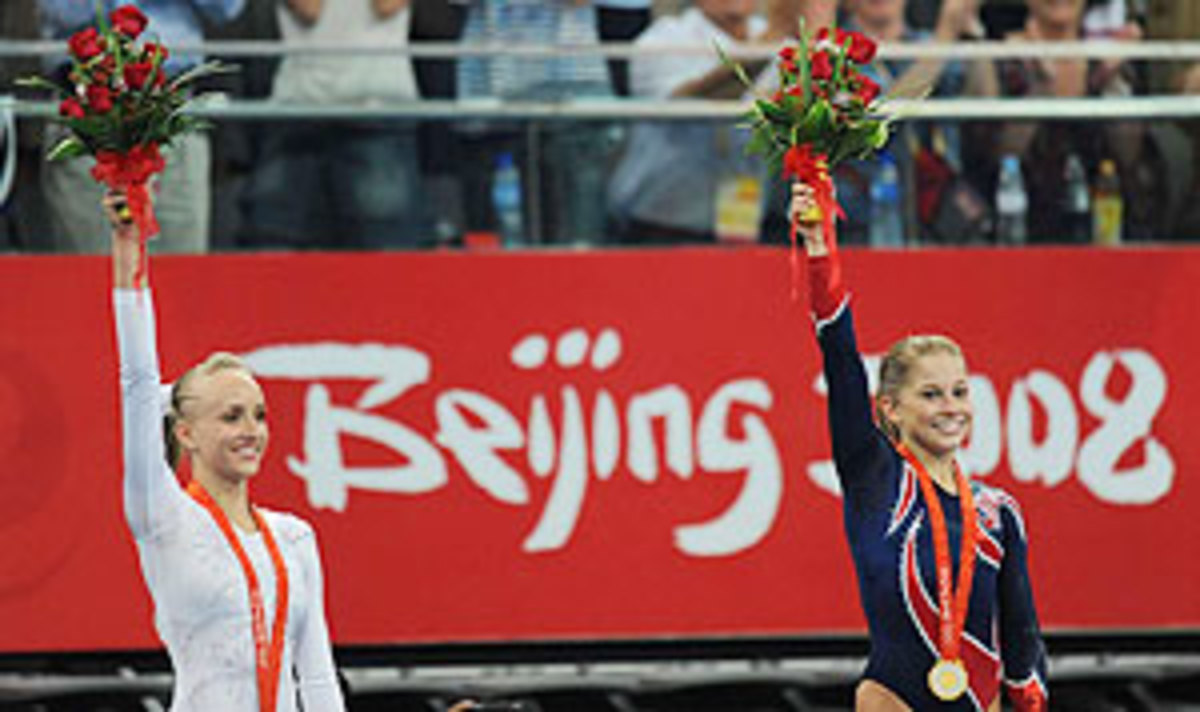
Americans end gymnastics run with a pot of gold
For Horton, it was a who'd-a-thunk-it moment. The bar is his favorite apparatus, but he'd barely sneaked into the apparatus finals on it, qualifying eighth out of eight places with a 15.575 on Aug. 9.
Knowing that his 6.4 start value wasn't going to get it done in the finals, however, he and coach Mark Williams went back to the drawing board and added a couple of big tricks -- a Cassina and a layout Kovacs -- altering some 30 percent of his routine, Williams estimated. How long did they have to perfect it? Three days.
"Three days with John is like three months with another gymnast," Williams said. "[Team coordinator] Ron Brant told me that nobody ever puts in a new routine during the Olympics and hits it. But I've been working with John four years, and once I saw him doing it in practice, we were very comfortable putting it in."
The new tricks raised Horton's start value a full .5, from 6.4 to 6.9 -- on a par with the top qualifiers in the bar. When the Chinese coaches saw him practicing the new stuff, they asked men's coach Ken Mazeika it's start value. "Secret," Mazeika said. And one of the reasons it stayed a secret was that Horton never once put the entire routine together in practice.
"I'd do half the routine, then I'd stop," said Horton, who starred for NCAA champion Oklahoma. "Then I'd do the other half later. It was too tiring to do all at once. But I've done every one of those skills before, just never all together in a single routine. I trust myself. Go big or go home, that's my motto."
He definitely went big, scoring 16.175, just .025 behind gold medalist Zou Kai of China. "If I'd stuck my landing I might have had a different color medal," Horton said afterward. "But I can't complain. This was my first event final, and I just had fun with it. I'm a daredevil, and I just went crazy."
Earlier in the evening, the U.S. women's tandem of Johnson and Liukin finished their storybook Olympics in fitting style, with Johnson winning her first gold medal to go with three silvers, and Liukin winning her third silver medal to go with a gold in the all-around and a bronze in the floor. The five-medal haul for Liukin tied her with Mary Lou Retton (1984: one gold, two silver, two bronze) and Shannon Miller (1992: two silver, three bronze) for most medals by an American gymnast at an Olympics. It also put her one up on her father and coach, Valeri, who won four medals, two gold, two silver, in 1988.
"He'll come back and say, 'But I've got two gold,'" she laughed. "But having nine Olympic medals in the family is pretty cool. It was so great to be able to share this experience with my Dad. It made it more than a dream come true. It's a little sad now. We trained our entire lives for this moment, and it's over like a flash."
Maybe not over. The 18-year-old Liukin plans to keep training, and hasn't ruled out trying to make the team that goes to London in 2012.
For Johnson, whose 16.225 on the beam was the highest score she posted the entire Olympics, and .2 higher than Liukin's, the gold medal felt something like sweet redemption. All week the American coaches had felt that the judges had underscored the defending world all-around champion, and Johnson just kept going back out, hitting routine after routine, and coming up a little short with silver medals in the team, the all-around, and the floor competitions. She wasn't complaining, but let's face it, no one grows up dreaming of bringing home the silver. The beam, her favorite apparatus, was her last chance for gold.
"Her tumbling skills on the beam are unmatched," said team coordinator Martha Karolyi. "She proved that over and over at these Olympics. Shawn tumbles on the beam like anyone else on the floor, and it's hard to figure out why the judges kept holding back her marks."
It didn't look good in the warmups, either. "I did seven beam routines in the afternoon, and I kept making very uncharacteristic mistakes," Johnson said. "It was just fatigue. [My coach Liang] Chow was getting nervous, and he finally told me to stop, to take a second and gather myself. So I sat down and settled myself down, then I did one good routine before we went out. Once I was on the beam in the competition I felt calm and just let myself go. I didn't worry about the score or the placement. I knew in my heart what I deserved."
And of course she finally got it: an Olympic gold medal. "To get a gold in my favorite event ... it's the perfect ending," she said.
Storybook. Just like the Beijing Games were for the roommates Liukin and Johnson. Nine medals. Two girls. One room.




